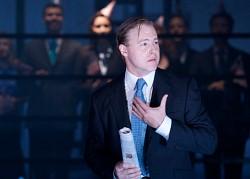Enron - Noel Coward Theatre 2010
It's always useful to remember that free market economics - capitalism if you prefer - brought us the slave trade, the stock market crash of 1929, the Great Depression, as well as more recent events such as the near meltdown of the entire global financial system. Not a record to be proud of you might think. Devotees of the system would argue otherwise, no doubt.
The free market might be the best solution to the thorny issue of resource allocation, but since the essential motive behind it is self-interest, abuse is inextricably bound-up with the system and always will be. When there are huge returns to be gained, there will inevitably be people who will manipulate the system to feather their own nests.
And that's more or less what 'Enron' shows us. It's a kind of stage biography of a company which failed spectacularly in 2001 when it filed for bankruptcy. It had previously been named 'the most innovative company in America' for 6 years by Fortune magazine (how misguided can you be?) and at one point was worth around 70 billion dollars. But the innovation in the business was actually fraudulent - a success story built on the quicksand of vanity, a house of cards with a foundation of pure greed.
When the show starts, Enron is already a huge energy company, but CEO Jeffrey Skilling sets it on a new course trading energy-related financial instruments. He also brings forward future profits into the present using an accounting technique known as 'mark-to-market' - a shady sounding notion if ever there was one. Still, it succeeds in driving-up Enron's share price to ludicrous levels even if there are no real profits to back-up the success. Before long, Skilling is looking to paper over the emerging cracks and finds a willing accomplice in sidekick Andy Fastow who sets up numerous other companies to soak-up Enron's debts.
The small screen can, in general, handle business stories much better than the stage. In TV documentaries, you can have in-depth interviews which provide background, and graphics and news reports can fill-in the gaps. If the producers here had taken a purely documentary, office-style approach to 'Enron', I think it would probably have ended up being incomprehensible to the vast majority of people and also extremely boring. Fortunately, the creative team took justifiable risks and opted for a format which is a mix of drama, pantomime, musical and fantasy. The near-brilliant recipe is underscored by inventive direction by Rupert Goold, and a well-engineered set from designer Anthony Ward displays share prices and TV reports on a huge trading board, while allowing us to witness behind the scenes action. Lucy Prebble's script provides simple, but not simplistic, explanations of complex financial concepts which are often illustrated in novel ways, eg with reptiles standing in for subsidiary companies.
In the acting department, Samuel West produces a compelling performance in the lead as Jeffrey Skilling. At first he's a kind of raving financial evangelist, but eagerly assumes the mantle of top dog when his ideas are adopted. He's aided and abetted by Tom Goodman-Hill as Andy Fastow, Skilling's devotee who descends over the progress of the piece into a kind of mad professor. Tim Pigott-Smith is the laid-back Ken Lay, founder of Enron, who largely keeps above the fray with his hands unsullied by the dubious practices, but knows all along what is going on. Bankers Lehman Brothers are personified as Siamese twins and accountancy firm, Arthur Anderson (which became a casualty of the Enron downfall), are portrayed as a ventriloquist and his dummy.
As a stage production, 'Enron' is enormously enjoyable - its slick, witty and entertaining. But as a condemnation of business and the system itself, it's immensely depressing - you just know that the same kind of thing will happen again on an even bigger scale and with more savage consequences at some point in the future. What really stinks about the Enron affair is that a whole army of so-called 'professionals' - lawyers, bankers and accountants - who we are supposed to 'trust' - were all happy to share in Enron's seeming success by lining their pockets with fat fees with no questions asked. And official regulation seems to have been nowhere in sight. Staggering!
"A highly theatrical staging to the events that ended in the biggest bankruptcy in American corporate history."
Benedict Nightingale for The Times
"There is superb clarity in Prebble's story-telling as well as high drama, and terrific bravura about Rupert Goold's often dazzling production that brings the mysterious world of high finance to vivid, comprehensible life. "
The Daily Telegraph
"I admired Prebble's piercing and principled clarity.But watching the production for the first time now, it struck me as, well, a just a tad sophomoric, or at least what a bright, ambitious undergraduate might concoct if s/he had a healthy budget."
Paul Taylor for The Independent
"Dazzling account of the collapse of the Texan energy giant ."
Fiona Mountford for The Evening Standard
"A solid creation with solid characterisation and a thumping good plot - a plot that's all the better because it is pretty much true."
Jeremy Austin for The Stage
External links to full reviews from popular press
Times - Telegraph - Independent
Originally published on
